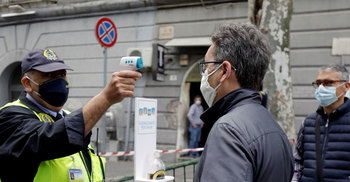India’s coronavirus cases cross 50 lakh

India's total coronavirus cases passed 50 lakh on Wednesday, health ministry data showed, as the pandemic extends its grip on the vast country at an ever-faster rate, reports Deccan Herald.
With its latest one million cases recorded in just 11 days, a world record, India now has 50.2 lakh infections. Only the United States has more, with 65.9 lakh.
India has for some time been recording the world's biggest daily jumps in cases, and on Wednesday, the rise was just over 90,000 with a record 1,290 deaths.
While India took 167 days to reach one million cases, the next million came in just 21 days, faster than the US and Brazil.
Just 29 days later, India became only the third country after the US and Brazil to post four million infections. India passed Brazil earlier this month.
Even so, and with India now testing around a million people daily, many experts say that this is not enough and that the true number of infections may be far higher.
This has been borne out in several studies in recent weeks measuring antibodies against the virus among the cramped populations of megacities New Delhi and Mumbai.
The India Council for Medical Research, the country's lead pandemic agency, said last week that its survey had suggested that already in May, 6.5 million people were infected.
The same goes for deaths -- 82,066 as of Wednesday, less than half the US toll of 195,000 -- with many deaths not properly recorded by authorities even in normal times.
India has one the world's most poorly funded healthcare systems and the nation of 1.3 billion people is home to some of the most densely populated cities and towns.
The sharp rise in cases is despite Prime Minister Narendra Modi's government imposing in late March one of the world's strictest lockdowns, leaving tens of millions of people in the informal labour market jobless almost overnight.
The lockdown saw complete travel bans, shutting down of businesses and factories, and the flight of millions of poor migrant workers from big cities to their villages that experts say caused the virus to spread from urban centres to small towns.
India's GDP slumped nearly 24 per cent in the first quarter, one of the steepest drops among major economies.
The lockdown has been steadily eased even as infections soar, with schools set to open for some classes on Monday -- along with tourist hotspot the Taj Mahal.
"Initially there was a fair amount of rigour in the lockdown but subsequently there was some relaxation before it was completely lifted," K. Srinath Reddy, head of health charity the Public Health Foundation of India, told AFP.
"It sent a wrong signal to the people that possibly we have got things reasonably under control and now the economy takes precedence. The virus is now infecting more people and penetrating deeper into smaller towns."







